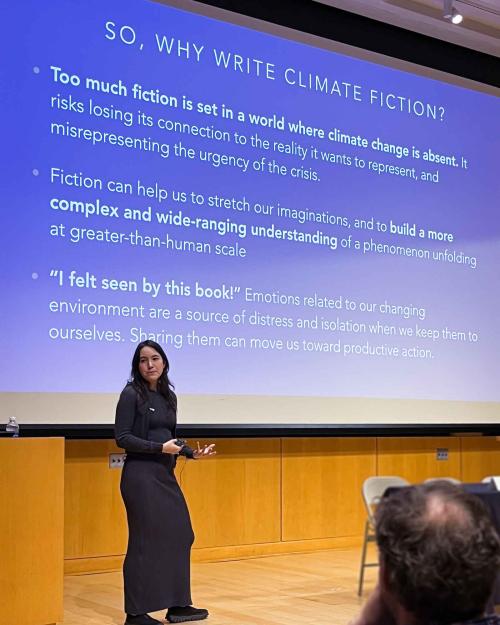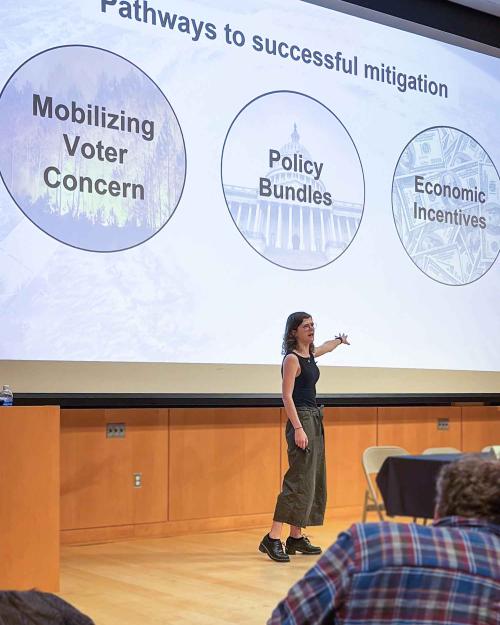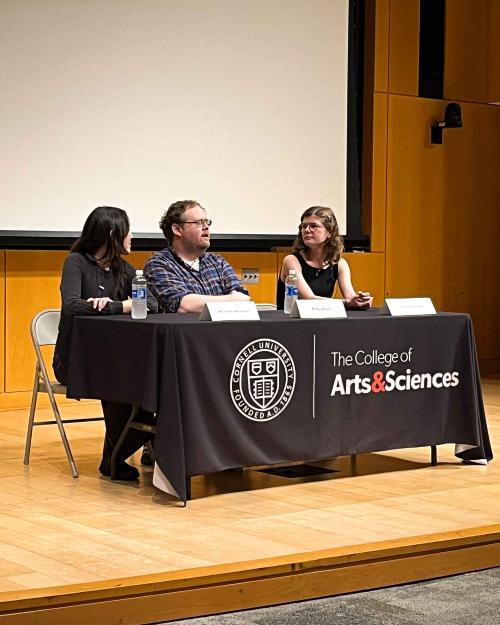Professors whose research spans the humanities, social sciences and physical sciences shared the way their work impacts — and brings hope to — the issue of climate change during a Cornell Reunion 2025 panel.
Talbot Andrews, assistant professor of government; Alexandra Kleeman, associate professor of literatures in English; and Phillip Milner, associate professor of chemistry and chemical biology, all in the College of Arts & Sciences, presented their work at the June 6 panel, "Beyond the Apocalypse: New Narratives and Innovations for Climate Action," sponsored by the College.
“I think of climate change as a crisis of imagination,” said Kleeman, whose 2021 novel, “Something New Under the Sun,” centers on the topic. “We understand that climate change is a crisis in the world, but we have difficulty bridging it to our lives and conceiving of its magnitude.”
Kleeman said stories can connect the dots of climate change and help people comprehend the issue.

Reading excerpts from the novel, Kleeman shared how she used the philosophical theory of a “hyperobject,” something so massive it can’t be understood, as she crafted the story.
Tying the local to the global, Kleeman said she chose to locate the story in California for many reasons, including its ecosystem of wild natural areas next to a metropolis; she chose water as a pressure point; and she gave readers a sense of scale by featuring a wildfire’s impact on other characters in the story.
“Too much fiction is set in a world where climate change is absent,” she said. “It no longer matches the reality we’re dealing with.”
But fiction that include climate change issues can help us stretch our imaginations, she said, to build a more complex and wide-ranging understanding of the phenomena. And sharing the stories can help readers know they aren’t alone in their worries about climate change and spur them into action.
Milner highlighted some of Cornell’s scientific contributions to the study of climate change. His research focuses on new technologies to capture carbon from emission sources and from the air.
Chemists have created absorbent molecules that can selectively capture CO2, but the energy consumption for this process is massive and their stability isn’t great – these are some of the problems Milner’s lab is working to address.
“We’ve taken inspiration from that chemistry in new ways to come up with different types of molecules,” he said. One of those technologies puts reactive sites into a sponge that is capable of removing CO2 from the air.
Milner’s research team has also teamed up with Cornell’s power plant to test carbon capture materials on the plant’s flue gas. With partners in the College of Engineering and funding from the Atkinson Center for Sustainability, Milner’s lab is creating a trailer that will be attached to the power plant for researchers from around the world to test their best catalysts and technologies.
Another of Milner’s students is working on a project using sunlight to power carbon capture, reducing the energy usage involved in removing the carbon from the absorbent material.
Andrews is interested in political aspects of climate change, studying how everyday people think about climate change, climate disaster and climate policy.
Using surveys, past research and data, she is studying how people can be mobilized to care about the issue, how climate policies can be pushed forward in public discussion and how economic incentives can be best used to address climate change.

“My research shows a lot of reasons why we should be optimistic about fighting climate change,” she said. “But there are some pretty major roadblocks that we’re grappling with.”
Using results from a survey of 8,000 people during the 2020-21 wildfires, Andrews found that people closer to fires were more concerned about climate change and had stronger support for government action on climate change. But that support was somewhat short-sighted, as people supported adaptation (preparing homes and communities for wildfires) more than they supported mitigation efforts.
She also found that much of the media coverage on climate change is framed in disaster, “making people become so emotionally overwhelmed that they tune out,” she said.
She offered solutions, such as bundling mitigation policies with adaptation policies; encouraging communities to focus on the co-benefits of climate change mitigation, such as infrastructure and tax benefits and a cleaner environment; and highlighting success and reasons for hope to help prevent public burnout.
After the presentations, audience members asked the faculty to address climate-related questions on topics ranging from electric car and AI energy usage to solar and wind power impacts to the Trump administration’s cuts to scientific research on related topics.
Milner said he was recently told to remove the words “sustainability,” “energy-efficient,” “climate” and other words from a grant to the Department of Energy, the major funder of climate-related research in the U.S.
“I’m not sure how much longer my lab can keep working on those climate solutions I just showed you because chemistry is very expensive and we have a lot of graduate students working on this,” he said, adding that he’s had one grant already terminated. “It’s a very stressful time to be a scientist, especially one working on what are now forbidden topics.”




